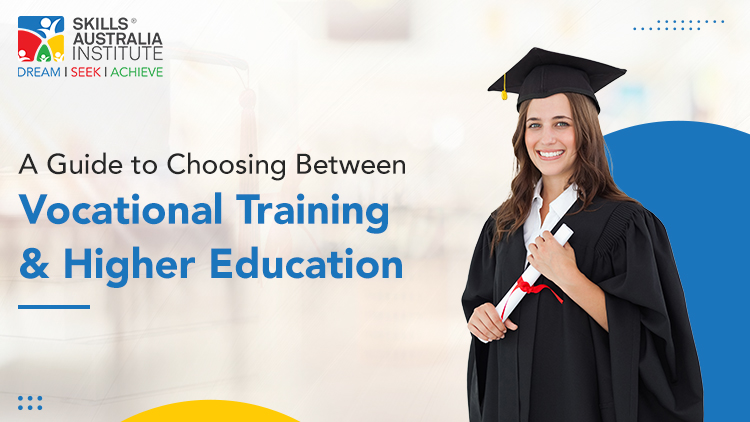- About
- Courses
- International Students
- Domestic Students
- Student Services
- Agents
- Contact

When choosing between higher education and vocational training to study in Australia, the options can be really overwhelming. People frequently find themselves at a crossroads in Australia’s diverse educational landscape. Every route has its benefits, meeting the needs of various learning styles, professional aspirations, and personal preferences. This blog will talk about vocational training and higher education in Australia and compare the two to help students make a wise choice.
Vocational education and training, or VET as it is commonly known, is a type of training that concentrates on imparting the practical skills and knowledge needed for particular industries or professions. Numerous education institutes provide vocational courses in Australia. This highly experiential education prepares students for direct entry into the workforce. Vocational training programs cover various industries, including trades, hospitality, healthcare, and information technology. Students can also pursue certificate-level qualifications and advanced diplomas after completing vocational courses.
Given below are some important benefits of pursuing vocational education in Australia:
Focusing on job-specific, practical skills is one of the main benefits of vocational training. By participating in real-world situations, students get practical experience they can use in their chosen field of study. Vocational training directly prepares you for the real world.
Compared to traditional higher education pathways, vocational courses enable students to enter the workforce more quickly by providing them with the skills required for entry-level positions.
Vocational training programs are frequently created in conjunction with professionals from the industry to keep the curriculum up to date and in line with the demands of the labour market. This direct link to industry needs improves the ability of graduates to find employment.
Vocational education is typically less expensive than advanced education degrees. This especially appeals to people who want to learn useful skills without taking on a large amount of student debt.
Let us now talk about pursuing higher education in Australia
In Australia, university-level coursework leading to bachelor’s, master’s, and doctoral degrees is referred to as higher education. Generally speaking, these programs provide a deeper comprehension of a particular subject, research skills, critical thinking, and a more theoretical approach to education.
Given below are some benefits of studying bachelor’s, master’s or doctorate in Australia;
Postsecondary education affords a more comprehensive examination of academic subjects, presenting avenues for theoretical comprehension, critical analysis, and research. This depth may be essential for those looking to work in academia, research, or other highly specialized fields.
Higher education provides more career options than vocational training, focusing on particular job skills. Degree holders can pursue careers and industries outside of their field of study.
Through industry partnerships, guest lectures, and alumni networks, universities frequently offer a wide range of networking opportunities. During college, developing a strong professional network that will help with future career opportunities can be advantageous.
A higher level of education may be necessary for certain professions, particularly those in management, leadership, or specialized roles. A bachelor’s or master’s degree can help you get higher-level jobs and promotions.
Vocational education and training are typically less expensive than higher education degrees. When it comes to tuition, certificate-level courses—which are typical in vocational training—may be less expensive than associate’s or advanced diploma programs. The cost of bachelor’s and master’s programs is typically higher. However, tuition costs can differ depending on the university, the kind of program, and the degree level.
Given below are some important considerations when choosing between vocational education and higher studies in Australia:
Think about your long-term objectives and desires for your career. Vocational training can be a better option if you have a specific job or industry in mind that values practical skills. Higher education can be the best option for people looking for jobs that require a deeper comprehension of theoretical ideas or research.
Think about how you prefer to learn. Vocational training may better fit you if you are a hands-on, practical learner. Higher education, however, might be a better fit if you value intellectual challenges, theoretical discussions, and independent study.
Assess your financial status and consider the price of every educational option. Higher education might cost more, even though vocational training is typically more affordable. Consider the potential return on investment in terms of future career opportunities as well as your willingness to take out student loans.
Find out the particular requirements for the industry or field you want to work in. Some professions may place a higher value on practical knowledge and real-world experience, which makes vocational education a more direct route to employment. On the other hand, some people might think that academic credentials are more important.
In Australia, deciding between further education and vocational training is a big decision that needs to be carefully thought out in light of personal preferences, professional aspirations, and financial constraints. Both routes present worthwhile chances for both professional and personal development; the secret is to match your decision to your goals and the field requirements you have selected. You can lay the groundwork for a prosperous and satisfying career by carefully considering the benefits of each choice and being aware of your priorities.